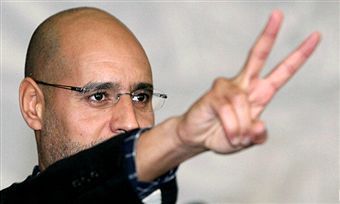 There’s truth in the cliché that actions speak louder than words. Benjamin
Barber, once a board member of the Saif Gaddafi Foundation, has
defended his former patron in today’s Guardian. He declares:
There’s truth in the cliché that actions speak louder than words. Benjamin
Barber, once a board member of the Saif Gaddafi Foundation, has
defended his former patron in today’s Guardian. He declares:
‘I still believe that among the conflicting voices that vie for Saif’s tortured soul there is the voice of a genuine democrat and a Libyan patriot.’
Barber condemns Saif’s ‘abominable actions in the current crisis’, but remains convinced that his dalliance with democracy was genuine. Oblivious of the attendant irony, Barber cites Saif’s book, Manifesto, where the man who would later vow to fight to the death through rivers of Libyan blood wrote:
‘I believe it is the duty of the people to rebel against tyranny.’
Blood, it seems, runs thicker than anything. But perhaps that is to be too generous to those whom Saif once beguiled. Several weeks ago, Daniel Finkelstein observed (£) that ‘academics did not flatter the Gaddafis for money but because they believed in their ideas. And that is worse.’ The level of creduility shown to the Gaddafis is scarcely credible. There were numerous indications that Saif’s protestations lacked any conviction. He ended an interview with Justin Marozzi, given as part of the rehabilitate Libya tour of 2002, by saying:
“We are a sovereign country and we will do whatever we want.”
I’d venture that he was referring to the Gaddafi clan as a sovereign power, not the polity in whose oppression he has been openly colluding.
Reports claim that Saif now recognises that his father’s position is hopeless, while still striving to save his own. He has therefore been trying to re-cast himself as a peace-maker. Barber asks if Saif can be trusted to oversee an interim government that introduces reform. The answer should be obvious.






Comments